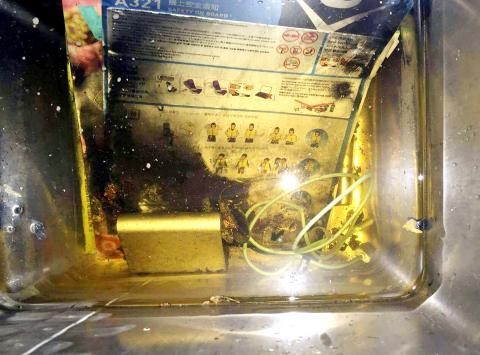A fire broke out in the cabin of a V Air passenger liner bound for Japan on Friday night after a portable battery in a passenger’s carry-on luggage spontaneously caught fire in the first incident of its kind affecting a Taiwanese air carrier, the Aviation Safety Council (ASC) said yesterday.
“This was the first incident of a mobile device power source triggering a fire on a domestic airliner in flight,” council executive director Thomas Wang (王興中) said.
He said that between 1991 and last year there have been more than 170 incidents involving lithium battery explosions on commercial aircraft worldwide, but this was the first case involving a Taiwanese air carrier.

Photo: Copy by Chu Pei-hsiung, Taipei Times
“The council plans to investigate the case,” he said.
The device in question was a lithium battery made in China, the Civil Aeronautics Administration said, adding that it was not immediately clear what type of electronic device it was used to power.
Wang said that the battery did not catch fire because it was on an aircraft in flight, and it would have caught fire even if it had not been brought onto the plane.
There have been discussions on whether mobile power sources should be allowed on airplanes, he said, but cell phones also have lithium batteries and “the possibility of banning them is not high.”
Current practice among the world’s airlines is that mobile power sources — as long as they are kept in carry-on luggage — can be brought aboard aircraft, he said.
Flight ZV252 took off from Taiwan Taoyuan International Airport for Haneda Airport at 10:26pm on Friday.
The fire was put out shortly after it began, and the battery was placed in a bucket of water to ensure that it would not reignite.
All the aircraft’s 161 passengers and crew members were unharmed in the incident.
Due to safety concerns, the captain flew the aircraft back to Taoyuan airport.
The aircraft arrived at the airport at 11:21pm and was confirmed not to have been damaged. The budget air carrier, in consideration of the lingering smell of smoke, arranged for the passengers to take another flight, which left at 12:30am yesterday.
The airline said that the council had confirmed the safety of the aircraft before it was put back into service yesterday.
When the crew members return to Taiwan, they will be questioned so that officials can learn more about the fire, the council said.

The High Prosecutors’ Office yesterday withdrew an appeal against the acquittal of a former bank manager 22 years after his death, marking Taiwan’s first instance of prosecutors rendering posthumous justice to a wrongfully convicted defendant. Chu Ching-en (諸慶恩) — formerly a manager at the Taipei branch of BNP Paribas — was in 1999 accused by Weng Mao-chung (翁茂鍾), then-president of Chia Her Industrial Co, of forging a request for a fixed deposit of US$10 million by I-Hwa Industrial Co, a subsidiary of Chia Her, which was used as collateral. Chu was ruled not guilty in the first trial, but was found guilty

DEADLOCK: As the commission is unable to forum a quorum to review license renewal applications, the channel operators are not at fault and can air past their license date The National Communications Commission (NCC) yesterday said that the Public Television Service (PTS) and 36 other television and radio broadcasters could continue airing, despite the commission’s inability to meet a quorum to review their license renewal applications. The licenses of PTS and the other channels are set to expire between this month and June. The National Communications Commission Organization Act (國家通訊傳播委員會組織法) stipulates that the commission must meet the mandated quorum of four to hold a valid meeting. The seven-member commission currently has only three commissioners. “We have informed the channel operators of the progress we have made in reviewing their license renewal applications, and

Taiwan People’s Party (TPP) Chairman Huang Kuo-chang (黃國昌) yesterday appealed to the authorities to release former Taipei mayor Ko Wen-je (柯文哲) from pretrial detention amid conflicting reports about his health. The TPP at a news conference on Thursday said that Ko should be released to a hospital for treatment, adding that he has blood in his urine and had spells of pain and nausea followed by vomiting over the past three months. Hsieh Yen-yau (謝炎堯), a retired professor of internal medicine and Ko’s former teacher, said that Ko’s symptoms aligned with gallstones, kidney inflammation and potentially dangerous heart conditions. Ko, charged with

Taiwan-based publisher Li Yanhe (李延賀) has been sentenced to three years in prison, fined 50,000 yuan (US$6,890) in personal assets and deprived political rights for one year for “inciting secession” in China, China's Taiwan Affairs Office spokesman Chen Binhua (陳斌華) said today. The Shanghai First Intermediate People’s Court announced the verdict on Feb. 17, Chen said. The trial was conducted lawfully, and in an open and fair manner, he said, adding that the verdict has since come into legal effect. The defendant reportedly admitted guilt and would appeal within the statutory appeal period, he said, adding that the defendant and his family have